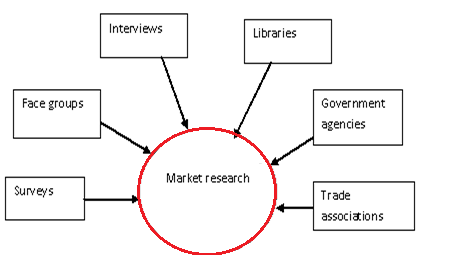Unveiling the Power of Market Research in Entrepreneurship
Market research plays a pivotal role in the success of any entrepreneurial endeavor. It provides invaluable insights into customers, competitors, and market trends, enabling entrepreneurs to make informed decisions and develop effective strategies. This article explores the definition and importance of market research in entrepreneurship and provides an overview of the article’s structure.
Overview of the Article’s Structure
To delve deeper into the topic of market research in entrepreneurship, this article is divided into the following sections:
- Understanding Market Research: This section explains the concept of market research, its purpose, and the key objectives it aims to achieve.
- The Market Research Process: Here, we outline the step-by-step process of conducting market research, including defining research objectives, gathering primary and secondary data, analyzing findings, and making informed decisions.
- Types of Market Research: This section explores different types of market research, such as exploratory, descriptive, and causal research, highlighting their unique characteristics and applications.
- Tools and Techniques for Market Research: We discuss various tools and techniques entrepreneurs can utilize for effective market research, such as surveys, interviews, focus groups, and data analysis software.
- How to Conduct Market Research: Conducting market research is a systematic process that involves gathering and analyzing data to gain insights into the market, customers, competitors, and overall business environment.
- Conclusion: Finally, we summarize the importance of market research in entrepreneurship and encourage entrepreneurs to prioritize this critical activity for business success.
By following this structured approach, entrepreneurs can harness the power of market research to gain a competitive edge, mitigate risks, and make data-driven decisions that propel their businesses forward.
Understanding Market Research

Market research is a systematic process of gathering, analyzing, and interpreting data about a target market or industry. It helps entrepreneurs gain insights into their customers, competitors, and market trends, enabling them to make informed decisions and develop effective strategies.
What Is Market Research?
Market research involves collecting data and information about various aspects of a market, such as consumer behavior, preferences, demographics, and buying patterns. It provides entrepreneurs with a deep understanding of their target audience and helps them identify opportunities, assess market potential, and mitigate risks.
Market research can be conducted through various methods, including surveys, interviews, focus groups, and data analysis. It can be both qualitative and quantitative, allowing entrepreneurs to gather both subjective and objective data to support their decision-making process.
Why Is Market Research Important in Entrepreneurship?
Market research is essential for entrepreneurs due to its significant impact on business success. Here are a few reasons why market research is crucial in entrepreneurship:
- Identifying Customer Needs and Preferences: By conducting market research, entrepreneurs can gain insights into their customers’ needs, preferences, and pain points. This knowledge allows them to tailor their products or services to meet customer demands effectively, increasing customer satisfaction and loyalty.
- Assessing Market Potential: Market research helps entrepreneurs evaluate the potential size and growth of their target market. It provides information about market trends, competitor analysis, and customer behavior, enabling entrepreneurs to identify niche opportunities, target the right audience, and make informed decisions about market entry and expansion.
- Mitigating Risks and Uncertainties: Launching a new business or introducing a new product involves risks. Market research helps entrepreneurs identify potential risks, validate assumptions, and uncover potential roadblocks. By understanding market dynamics and customer preferences, entrepreneurs can minimize uncertainties and make strategic adjustments to their business plans.
- Making Informed Decisions: Market research provides entrepreneurs with valuable insights that support data-driven decision-making. It helps them evaluate the viability of new business ideas, understand market trends, determine pricing strategies, optimize marketing efforts, and identify areas for business improvement.
Key Objectives of Market Research
Market research serves several key objectives that are vital for entrepreneurial success. Here are two primary objectives of market research:
- Identifying Customer Needs and Preferences: Market research helps entrepreneurs gain a comprehensive understanding of their target customers. By analyzing customer demographics, behaviors, and preferences, entrepreneurs can develop products or services that align with customer needs and create a competitive advantage in the market.
- Assessing Market Potential: Market research enables entrepreneurs to evaluate the market potential for their offerings. By studying the market size, growth rates, and competitor analysis, entrepreneurs can identify the demand for their products or services, assess the competitive landscape, and make informed decisions about market entry, expansion, or diversification.
By pursuing these objectives through market research, entrepreneurs can effectively position their businesses, create customer-centric strategies, and drive growth in the highly competitive entrepreneurial landscape.
Types of Market Research

Market research encompasses different types of research methodologies that serve specific purposes in understanding the market landscape. In this section, we explore three primary types of market research: exploratory research, descriptive research, and causal research.
Exploratory Research
Exploratory research is conducted when there is limited existing information or knowledge about a particular market or problem. Its purpose is to explore and gain insights into the problem at hand. Here are key points about exploratory research:
- Purpose and Application: Exploratory research aims to generate hypotheses, uncover new ideas, and identify trends or patterns in a market. It is particularly useful in the early stages of research or when investigating complex or ambiguous problems.
- Methodology: Exploratory research typically involves qualitative methods such as interviews, focus groups, or observation. These methods allow researchers to delve deeper into consumer behaviors, motivations, and attitudes, providing a foundation for further research.
- Benefits: Exploratory research helps entrepreneurs gain a better understanding of the market, identify potential opportunities, and refine research questions for more focused investigations. It aids in generating initial insights that can guide subsequent research efforts.
Descriptive Research
Descriptive research aims to provide a detailed and accurate picture of a specific market, including its characteristics, behaviors, and preferences. Key points about descriptive research include:
- Gathering and Analyzing Data: Descriptive research focuses on collecting and analyzing quantitative data to describe and summarize market attributes. This data can be obtained through surveys, questionnaires, or secondary sources such as government reports or industry databases.
- Application: Descriptive research is commonly used to measure market size, determine customer demographics, assess buying behavior, and identify market trends. It helps entrepreneurs gain a comprehensive understanding of their target market and make informed decisions based on reliable data.
- Benefits: Descriptive research provides entrepreneurs with valuable information for market segmentation, target audience identification, and product positioning. It aids in identifying the unique selling points of a product or service and informs marketing strategies.
Causal Research
Causal research investigates cause-and-effect relationships between different variables. It aims to determine the impact of specific factors on consumer behavior or market outcomes. Here’s what you need to know about causal research:
- Establishing Cause-and-Effect Relationships: Causal research involves manipulating one or more variables to observe the resulting effects. It helps entrepreneurs understand how changes in pricing, advertising, or product features influence consumer preferences, purchase decisions, and overall market performance.
- Methodology: Causal research often utilizes experimental designs, where researchers create controlled environments to test hypotheses and analyze the effects of specific variables. Data analysis techniques such as regression analysis or A/B testing are commonly employed.
- Benefits: Causal research provides entrepreneurs with insights into the effectiveness of different strategies and tactics. It enables them to make informed decisions about marketing campaigns, pricing strategies, product enhancements, and other business initiatives.
Understanding these different types of market research allows entrepreneurs to select the most appropriate methodologies based on their research objectives and available resources. Each type serves a unique purpose in exploring, describing, or establishing causal relationships in the market, contributing to effective decision-making and business success.
Tools and Techniques for Market Research

Market research is a crucial component of understanding your target market, identifying customer needs, and making informed business decisions. To conduct effective market research, entrepreneurs can utilize a range of tools and techniques. Here are some commonly used tools and techniques for market research:
- Surveys: Surveys are a popular tool for collecting quantitative data from a large sample of respondents. They can be conducted through various methods, such as online surveys, mail surveys, or telephone interviews. Surveys allow entrepreneurs to gather information about customer preferences, behaviors, satisfaction levels, and demographics. Tools like SurveyMonkey, Google Forms, or Typeform can help create and distribute surveys easily.
- Interviews: Interviews involve engaging in one-on-one conversations with individuals to gather qualitative insights. In-depth interviews provide an opportunity to explore customer opinions, motivations, and preferences in more detail. Structured, semi-structured, or unstructured interview techniques can be used, depending on the research objectives. Tools like Zoom or Microsoft Teams can facilitate remote interviews.
- Focus Groups: Focus groups involve gathering a small group of individuals (typically 6-10) in a facilitated discussion. Participants share their opinions, attitudes, and perceptions about a product, service, or a specific topic. Focus groups provide qualitative insights and allow for group dynamics and interactions to uncover valuable information. Tools like Zoom, Microsoft Teams, or specialized focus group software can be used for remote or in-person focus groups.
- Observations: Observational research involves directly observing and documenting customer behavior in real-world settings. It can provide valuable insights into how customers interact with products, make purchasing decisions, or use specific services. Observations can be conducted through in-person observations, video recordings, or tracking customer behavior using sensors or technology.
- Secondary Research: Secondary research involves gathering existing data and information from various sources, such as industry reports, government publications, competitor analysis, or academic research. This helps entrepreneurs gain a broader understanding of the market, industry trends, customer demographics, and competitive landscape. Online databases, research publications, and websites like Statista, IBISWorld, or industry-specific journals can be valuable sources of secondary data.
- Data Analysis Software: Data analysis software helps entrepreneurs analyze and interpret quantitative data collected through surveys or other research methods. Tools like Microsoft Excel, SPSS, or Google Analytics provide capabilities for data cleaning, statistical analysis, and visualization. These tools allow for the identification of patterns, trends, correlations, and insights from large datasets.
- Social Media Listening: Social media platforms offer a wealth of real-time information and customer insights. Entrepreneurs can use social media listening tools like Hootsuite, Brandwatch, or Mention to monitor and analyze conversations, comments, and mentions related to their brand, industry, or competitors. This helps in understanding customer sentiment, preferences, and emerging trends.
- Online Communities and Panels: Online communities and panels are platforms where individuals voluntarily participate in research activities and provide feedback. These platforms allow entrepreneurs to engage with specific target audiences, gather feedback on products or services, and gain insights for decision-making. Tools like Toluna, SurveyMonkey Audience, or Qualtrics Panels offer access to large and diverse respondent pools.
- Customer Feedback and Reviews: Actively collecting and analyzing customer feedback, reviews, and ratings can provide valuable insights into customer satisfaction, product improvements, or areas of concern. Feedback can be gathered through online surveys, email campaigns, or feedback forms on websites and mobile applications.
- Competitive Intelligence Tools: Competitive intelligence tools enable entrepreneurs to gather information about competitors, including their products, pricing strategies, marketing activities, and customer feedback. Tools like SEMrush, SimilarWeb, or Ahrefs help monitor competitors’ online presence, keywords, search rankings, and advertising campaigns.
By utilizing these tools and techniques for market research, entrepreneurs can gather valuable insights into customer preferences, industry trends, and competitive dynamics. This information enables informed decision-making, helps refine business strategies, and enhances the chances of success in the marketplace.
How to Conduct Market Research

Conducting market research is essential for understanding your target market, identifying customer needs, and making informed business decisions. Here is a step-by-step guide on how to conduct market research:
- Define Your Research Objectives: Clearly define the goals and objectives of your market research. Determine what specific information you need to gather and what decisions or actions it will inform.
- Identify Your Target Market: Identify the specific target market or customer segment you want to study. Define the demographics, psychographics, and other relevant characteristics of your target audience.
- Determine the Research Method: Select the appropriate research method based on your objectives and target audience. Common methods include surveys, interviews, focus groups, observations, and secondary research.
- Develop a Research Plan: Create a research plan that outlines the details of your study. Determine the sample size, sampling method, data collection instruments, and timeline for conducting the research.
- Design the Research Instruments: If using surveys, interviews, or focus groups, develop the appropriate questionnaires or discussion guides. Ensure the questions are clear, unbiased, and designed to elicit the desired information.
- Collect Data: Implement your research plan and collect data from the identified sample. This may involve distributing surveys, conducting interviews or focus groups, observing customer behavior, or gathering secondary data from various sources.
- Analyze the Data: Once data collection is complete, analyze the data using appropriate techniques. This may involve coding and categorizing responses, conducting statistical analysis, or identifying patterns and trends in the data.
- Interpret the Findings: Interpret the data to gain insights and draw conclusions. Look for patterns, trends, and key findings that address your research objectives. Consider the implications of the findings for your business decisions.
- Communicate the Results: Prepare a clear and concise report that communicates the research findings and their implications. Use visual aids such as charts, graphs, and tables to present the data effectively. Clearly state the conclusions and recommendations based on the research findings.
- Take Action: Use the insights gained from market research to make informed business decisions. Adjust your marketing strategies, product offerings, pricing, or other aspects of your business based on the findings. Implement any necessary changes or improvements to better meet customer needs.
- Monitor and Update: Market research is an ongoing process. Continuously monitor market trends, customer preferences, and competitive dynamics. Update your research periodically to stay informed and adapt your strategies accordingly.
Remember, market research is a dynamic process that requires careful planning, execution, and analysis. By conducting thorough market research, you gain valuable insights that can guide your business decisions and increase your chances of success in the marketplace.
Conclusion
Market research is a powerful tool for entrepreneurs, providing invaluable insights for informed decision-making, risk mitigation, and identifying opportunities. By understanding target audiences, competition, market demand, and trends, entrepreneurs can align their business ideas with customer needs and tailor their products or services accordingly. Market research also helps entrepreneurs stay ahead of market changes, adapt their strategies, and foster resilience. Additionally, it serves as a risk management tool, enabling data-driven decision-making and reducing potential pitfalls. Overall, market research empowers entrepreneurs to navigate the business landscape effectively and unlock their full potential for success.

